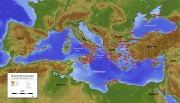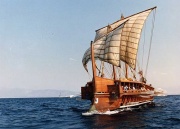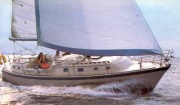Difference between revisions of "Main Page"
(→Statute) |
|||
| Line 54: | Line 54: | ||
| + | Greek registration n.: 2. 09/10/2014 | ||
| − | |||
| − | |||
| + | == Mediterranean Community == | ||
| + | '''Bold text''' | ||
| − | + | International Headquarters: Balos beach , Samos, Greece, 83104 | |
---- | ---- | ||
Revision as of 19:40, 16 October 2014
ContentsAncient Mediterranean Ports |
 Visit our Facebook page
Visit our Facebook page
History, Culture, Ecology & Peace in the Mediterranean
The Phoenicians, the Greeks, the Romans and other ancient civilizations used harbors and coves as anchorages for their ships, and it is where the first settlements were created. Today, there have been identified at least 272 such sites in 23 Mediterranean countries.In the recent past, many of these areas have tried to come into contact with each other, to network and collaborate on social, economic, cultural and environmental level. Such a major collaborative initiative began in 1995, when the Union of Ancient Greek Ports was founded, based in ancient Agathe, today’s Agde in southern France. The cities that formed this Union are: a) Larnaca and Paphos in Cyprus, b) Alexandria in Egypt, c) Agathe-Agde, Antipole-Antibes, Thilini-Arles, Nice-Nice, Olbia-Hyeres and Aleria in France, d) Fasis-Poti in Georgia, e) Chalkis, Pythagorean, Patras, Piraeus, Rhodes and Ithaca in Greece, f) Celery-Castel Vetrano, Castor-Crotone, Sybaris-Cassano Ionio, Santa Severina, Bova, Cerenzia, Cino Marina, Locri, Naxos-Naxos and Strongoli in Italy, g) Byblos - Byblos in Lebanon, h) Callatis-Mangalia in Romania, i) Gadeira-Candix and Trade-Escala Empuries in Spain, j) Djerba-Djerba in Tunisia and finaly, k) Sevastoupolis-Sevastopol in Ukraine.
According to a popular saying "the culture comes from the sea". In antiquity, a harbor was the key area of communication, trade and defense of a city. The ships that left the ancient Greek ports, transported goods, ideas and the democratic spirit of the colony, across the Mediterranean, from Tanaida to Tartessos, outside Gibraltar.
This entire life network is the historical and cultural background of contemporary societies of the Mediterranean coastal cities and, in historical sequence, of the entire western civilization. So, if we are to accept that today’s inhabitants of the Mediterranean are the “continuity” of ancient people, then ancient ports are the basis of the modern society culture. Therefore, the sailor athletic, archaeological, nutritional, economic, tourist and other cultures, are justifiably preserved and remain unchanged to this day.
Nowadays, however, the local culture tends to be eliminated, the sea is destroyed and peace is threatened. Technological progress and commodity sufficiency cause marine and water pollution, from one hand, and bring local communities to their cultural oblivion, on the other, the latter being turned into a global, technological, and commercial culture. The above mentioned pollution and globalized culture interweave through factors such as oil management and thus, foment war conditions. Therefore, who will deal with the cultural loss, the environmental issues and the peace of the Mediterranean, and how? With the emergence of ancient ports, the promotion of contemporary city culture and of civil partnerships, cities and states and the study of the contamination factors, we can now contribute to the deadly, for the Mediterranean, problems of the area, as to not bequeath them to the future generations.
Methodology:
Establish a Working Group in each geographical region which may comprise of:
a) sailors, b) photographers, c) historians or archaeologists of underwater archaeology, d) journalists and e) IT managers or multimedia application managers f) Environment related organizations g) Peace in the Mediterranean nets.
This Working Group may operate through:
1. The standardization of the recording: designate geographical coves and ports, record archaeological findings, index these records, archive and store them.
2. Organization activities such as:
• Projects (archaeological, artistic, historical, ecological etc) • Travelling following historical voyages • Twinning of organizations, cities, regions and states • Historical chart (e-book, maps) • Research activities and studies (digitization, virtualization, etc.) etc..
Welcome to the wiki pages of the ancient Mediterranean ports wiki.
MediterCom: Mediterranean Community
Statute
Greek registration n.: 2. 09/10/2014
Mediterranean Community
Bold text
International Headquarters: Balos beach , Samos, Greece, 83104
Chapter 1: General Provisions
Mission
According to a popular saying "the culture comes from the sea". In antiquity, was the key area of communication, trade and defence of a city. The ships that left the ancient Greek ports transported goods, ideas and the democratic spirit of the colony, across the Mediterranean, from Tanaida (Don river) to Tartessos, outside Gibraltar.
This entire life network is the historical and cultural background of contemporary societies of the Mediterranean coastal cities and, in historical sequence, of the entire western civilization. So, if we are to accept that today’s inhabitants of the Mediterranean are the “continuity” of ancient people, then ancient ports are the basis of the modern society’s culture.
Therefore, the sailor, athletic, archaeological, nutritional, economic, tourist and other cultures are justifiably preserved and remain unchanged to this day.
Nowadays, however, the local culture tends to be eliminated, the sea is destroyed and peace is threatened.
Technological progress and commodity sufficiency cause marine and water pollution, from one hand, and bring local communities to their cultural oblivion, on the other, the latter being turned into a global, technological, and commercial culture.
Pollution and globalized culture interweave through factors such as oil management and thus, foment war conditions.
Therefore, who will deal with the cultural loss, the environmental issues and the peace of the Mediterranean, and how?
With the emergence of ancient ports, the promotion of contemporary city culture and of communal partnerships, cities and states and the study of the contamination factors, we can now vanquish to the deadly problems threatening the physical and social fabric of the culture of the Mediterranean area, as to not bequeath them to the future generations.
Objectives
The objectives of the Mediter.Com are:
1. Organizing the on line documentation (wiki) of subjects such as History, Culture, Ecology and Peace in the Mediterranean.
2. Creating a consortium (twinning) among institutions and organizations in the towns and ports of the Mediterranean with historical, cultural, environmental and developmental concerns and interests.
3. Motivating each historical town/city to build, organize and use ancient vessels as an essential cultural element of the historicity of that town or city.
4. Writing and publishing of Historical Water Pilots (of the ancient towns and destinations).
5. Networking of educational and research organizations in terms of cooperation for the preservation and the prominence of cultural norms in the Mediterranean.
6. Building an ancient Mediterranean ship with contemporary technological infrastructure.
7. Publishing an electronic newspaper (Newsletter).
8. Establishing an annual conference / convention.
9. Formation of a network of cultural, scientific and social exchange among ancient cities and ports.
10. Establishing cooperative working groups in each Mediterranean country.
11. Supporting of classical sports and athletic activities and events among ports-cities.
12. Motivating the active contribution to adjacent subjects such as electronic games, research projects, summer schools, 3D models of the ancient site, etc.
13. Recognition /documentation of the ancient Mediterranean languages and pilot programme implementation locally.
14. Sailing and motivating Associations to organize Regattas/Races among/all the Ancient Mediterranean Ports.
15. Embedding the Historical Mediterranean Routes in leisure or training and creative activities.
16 Other related activities
Mediter.Com Organizational Structure
Core team
The Mediter.Com Core Team is the governing body of the Med.Soc with overall responsibility for managing the 3 Med.Soc Divisions: •Mediter.Com membership (Organization and individual), •Mediter.Com Initiatives •Mediter.Com Centre
The Core Team is responsible for electing new Core Team members and accepting resignations of existing Core Team members. The maximum size of the Core Team is seven Directors (including the officers of the Core Team). The Core Team is responsible for discussing and deciding on the major issues of the Society, convening meetings when necessary.
The Core Team is responsible for developing and adopting the work plan and financial budget reports of the Society.
The Core Team appoints the following Officers from its members:
•Mediter.Com Executive Chairman
•Mediter.Com International Chairman
•Mediter.Com Secretary General.
The period of office is 3 years in each case, and may be renewed for further 3-year periods at the discretion of the Core Team.
Secretariat
The Mediter.Com Core Team appoints the officers of the Med.Soc Secretariat. The offices include: • Secretary General • International Secretary
The Secretary General is the highest organ of authority of the Med.Soc Secretariat and has the responsibility of directing the day-to-day work of the Med.Soc secretariat, organizing the implementation of the work plan and monitoring the progress of work within the plan.
The Secretariat shall execute the following powers and duties:
• Provision of basic services to the Mediter.Com’s Organization and Individual members
• To be responsible for member liaison and management of Med.Soc initiatives a projects
• To be responsible for the website-related work of the Society
• To formulate the financial budget plan and expense reports
• Other authorities delegated by the Core Team
Benefactors
Benefactors of the Mediter.Com comprise organizations, institutions, funds, foundations and individuals who contribute to the development, well-being and effective operation of the Society from their own resources, both financial and non-financial. Benefactors must subscribe to the Aims of the Community and have policies consistent with these aims insofar as they impact on the Society, in the judgement of the Mediter.Com core team.
International Advisory Group
The Mediter.Com has an International Advisory Group, comprising international experts, infield directly relevant to the Aims, initiatives and projects of the Community. The Mediter.Com Core Team appoints the Chair and members of the International Advisory Group. There is no maximum period of appointment; members of the Group remain appointed so long as they are willing to remain active members. Members of the Group provide advice on in individual basis and are invited at least annually to meet together with the Mediter.Com Core Team to review progress, discuss achievements, and advise on new initiatives, etc. They may also be invited to join in the initiatives and projects of the Med.Soc.
Mediter.Com Centres
The first Mediter.Com Centre will be established in Greece at Samos (Balos beach, 83104)
Websites
www.ancientmedports.org
www.amfilissos.org
Initiatives
Mediter.Com will set up and maintain a platform of initiatives through which local and international creative talents and professionals can explore new genres, create digital content, and exchange information and experiences and develop new business models employing knowledge, creative resources and skills of creative professionals in application areas which provide substantial social and ecological benefits at community, regional, national and international levels.
Specifically, Mediter.Com will establish a Working Group in each geographical region which may comprise of: a) sailors, b) photographers, c) historians or archaeologists of underwater archeology, d) journalists and e) IT managers or multimedia application managers f) Environment related organizations g) Peace in the Mediterranean nets.
This Working Group may operate through:
1. The standardization of the recording: designate geographical coves and ports, record archaeological findings, index these records, archive and store them.
2. Organization activities such as:
• Projects (archaeological, artistic, historical, ecological etc)
• Traveling following historical voyages
• Twinning of organizations, cities, regions and states
• Historical chart (e-book, maps)
• Research activities and studies (digitization, virtualization,etc.)
Mediter.Com showcase Events
Mediter.Com will organize locally a range of showcase event, such as those initially planned for Greece (Samos) Turkey (Teos) Italy (Crotone) Syria, etc
Chapter 3: Conditions for Membership
Membership of the Mediter.Com is available to Organizations and Individuals with an active interest within the field of the Local Working Team that share the mission and endorse the objectives of the Mediter.Com. Admission to membership is at the discretion of the Mediter.Com Core Team.
Corporate Membership
For applying to join the Society as an Enterprise (corporate) Member, the applicant shall satisfy the following conditions:
1. Local or international enterprise or organization, having relevant resources in developing Working Team, or
2. Local or international enterprise or organization, aiming to contribute or promote activities of Mediter.Com, or
3. Local or international organization interested in contributing and promoting the development of the Society
4. Endorses the Statute of the Society and fulfilling all obligations of the Society
An Organization, meeting the above conditions, desiring to become a member of the Med.Soc should, in the first instance, contact a member of the Mediter.Com Core team to discuss their application
Individual membership
For applying to join the Society as an Individual Member, the applicant must satisfy the following conditions:
1. Be engaged in Mediter.Com activities and/ or relevant fields;
2. Be keen on the development of the objectives, and/or promoting these objectives within the Mediterranean Areas (Working Team);
3. Have expertise and knowledge about History, Culture, Ecology, Peace process and/or their applications in relevant fields;
4. Endorses the Statute of the Society and fulfilling all obligations of the Society.
An individual, meeting the above conditions, desiring to become a member of the Med.Soc should, in the first instance, contact a member of the Med.Soc Core team to discuss his or her application.
Resignation and Expulsion
If an Mediter.Com member of the Society becomes bankrupt, closed, liquidated or taken over, it will automatically lose its membership of the Society. A SME or Individual member of the Society can resign from the Society due to its own reasons and is required to send a written application to the Society’s core team in this respect.
If a member resigns from the Community, the member shall stop acting on behalf of the Society and should stop all activities involving the Community. Any annual fees paid will not be refunded.
If a member violates the mission and responsibilities of the Society or the obligations stipulated in the Statute, and no agreement can be achieved after negotiation with the Mediter.Com Core Team, the Society will regard the relevant SME or individual member as expelled, notify all members of the Society accordingly, and stop all of the ex-member’s activities in the Community.
Chapter 4: Rights and Obligations of the Community Members
Rights
The Community Members can equally enjoy all rights as follows:
1.To enjoy the rights to the use of the Trademark and visual identity (logo) of Mediter.Com.
2.To release one's own relevant information and news through all platforms of the Society (the Society's activities, website and meetings etc.), to enjoy free on-line publishing services provided by the portal site of the Society (the released information shall be in consistent with the themes and topics of the columns shared by the Society's members)
3.To benefit from the Society in developing creative business
4.To participate in Community’s Initiatives and projects, upon the written approval from the Mediter.Com Core Team
5.To organize activities in the name of the Community, upon the written approval from the Community Secretariat
6.To give suggestions and opinions about Community initiatives and projects and the development of the Mediter.Com Centre
7.To facilitate communications among members via the Mediter.Com Secretariat
8.To participate in activities such as trainings, seminars, workshops, exhibitions and Creative International forums etc. organized by the Society in favourable prices
Obligations
Members of the Community shall fulfil all the following obligations:
1. To adopt by the Statute and all the resolutions by the Community
2. To assist the development of the Community, undertake any tasks that have been entrusted by the Society with the prior agreement of the member, and seek to extend the resources and network of the Society
3.To assist in developing networks and contacts in the region where the member is located
4.To initiate or undertake the project work of the Society for the purpose of promoting cultural, ecological and Peaceful to support and actively participate in activities organized by the Society
5.To pay any agreed membership fees on a regular basis (the current individual membership fee is 100 Euro and of the Corporate Membership 500 Euro per year.
6. To maintain the Community’s reputation and legitimate rights, and those rights owned by third parties that are licensed to the Community, and protect the Community's research achievements
7. In the case of corporate membership: to appoint a contact person to be responsible for the daily liaison work of the Community
Chapter 5: Sources and uses of funds
Core Finance
The Mediter.Com is financed by subsidies and endowments from benefactors in society and government, membership dues, administration fees or subventions charged for activities and projects or other sources according to the acting laws and serving the non-profit purposes of the Mediter.Com. All income will be utilized in managing the daily operation of the Society and the A.M.S centre, web maintenance, the development of initiatives projects, conferences and workshops benefiting the Society’s membership, international liaison, and contributions to the Mediter.Com foundation.
Mediter.Com Initiatives and Project Funding
Upon the approval of the Mediter.Com Board, development funds can be appropriated to the initiatives and projects initiated by the Community.
Chapter 6: Miscellaneous
For anything not listed in this statute or relevant articles, upon the approval of the Core Team, the statute can be complemented or amended.
The right of interpretation of the statute shall reside in the Mediter.Com Core Team If there is any discrepancy between different language versions of the Statute, the other language version shall prevail.
The Med.Soc registered trademark is owned by the Mediter.Com core team. It is licensed, non-exclusively to Mediter.Com members for their own use, so long as they remain accredited members of the Community in good standing. The Mediter.Com should not be used or published in modified form and cannot be incorporated into any other trademark.
Appendix 1: Current Core Team and Officers of the community (October 2014)
Mediter.Com Core Team
Dr Stamatis Skoutas Mediter.Com Executive Chairman
Prof. Ptrick Humfreys Mediter.Com International Chairman
Mrs Eirini Skouta Mediter.Com Project Manager
Prof. Carol Lorac Mediter.Com International Secretary
Prof. Andreas Papasalouros Mediter.Com International Advisory Group
Biographies
http://ai-lab-webserver.aegean.gr/ai-lab/dr_skoutas Mediter.Com Executive Chairman
.....................................................Mediter.Com International Chairman
.....................................................Mediter.Com Secretary General
.....................................................Mediter.Com Project Manager
.....................................................Mediter.Com International secretary
.....................................................Chair, Mediter.Com International Advisory Group
Appendix 2: Mediter.Com Founder Members
1. Mrs Eirini Skouta
2. Dr Stamatis Skoutas
Worldwide
www.ancientmedports.org ..................................................................................................... www.amfilissos.org ....................................................................................................... ....................................................................................................


